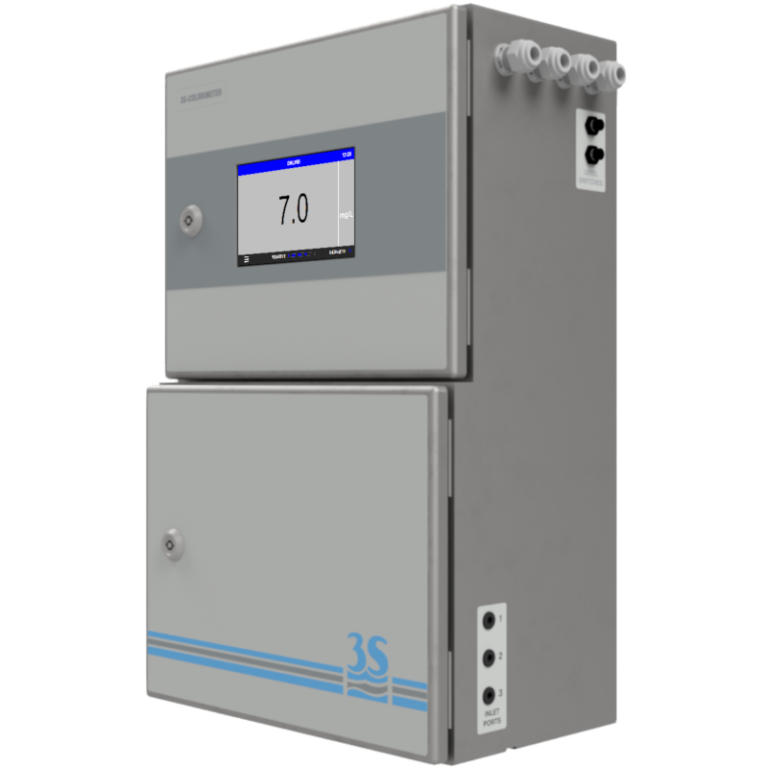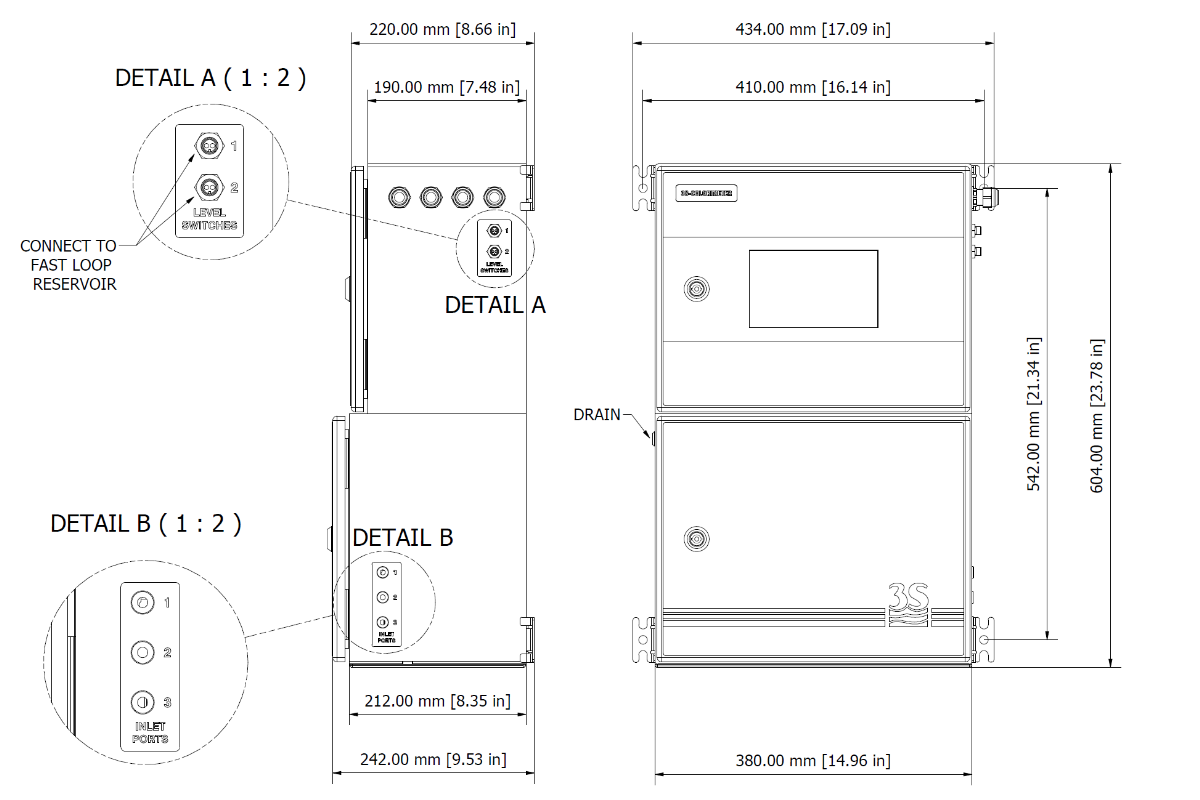Applications
- Drinking water
- Municipal wastewater
- Industrial wastewater discharge limit monitoring or process optimization
- Food and beverage
- Power and semiconductors
- Reverse osmosis (RO) process

Description
The 3S colorimeter is a compact analytical instrumentation for online analysis and process monitoring. The colorimeter is based on a color-developing chemical reaction carried out inside the analyzer's glass cell. The sample, coming from an external reservoir or process stream is autonomously grabbed by the instrument and mixed with the appropriate reagents to make the reaction happen. The analyzer uses an LED light source and a photodiode to photometrically measure the developed color intensity (absorbance). The absorbance is proportional to the concentration of the target chemical species (analite).
Features:
- Low reagents consumption and analytical reliability thanks to our custom designed miniature peristaltic pumps
- Dual compartment design to guarantee a complete separation between the electronics and the hydraulic section
- Color touchscreen to show the last measured value clearly, and to set all the options and settings via an user friendly interface
- Datalogger function with data history in graphical form and USB download
- Automatic calibration, validation and cleaning to reduce down time and operator intervention, their frequency can be freely set by the user
- Fully integrable in industrial automation via the analog outputs (2 x 4-20 mA channels), digital output (2 relays + ModbusRTU) and digital input (voltage free contact)
Chlorine is measured using the DPD colorimetric method (US EPA 4500-CI G and ISO 7393-2 accepted method). The determination ranges of the analyzer vary from trace μg/L to 200 mg/L Cl2 using the (optional) internal dilution module.
Method
Chlorine-containing samples are reacted with N,N-diethyl-p-phenylenediamine sulfate in the presence of a suitable buffer. The indicator and buffer are added and react with chlorine to produce a pink color. This compound is measured at 525 nanometers.
Features
| Measured parameter | Cl2 | ||||||
|
Range
|
|||||||
|
Reproducibility*
|
|||||||
| Limit of detection | 0.01 ppm | ||||||
| Wavelength | 525 nm | ||||
| Demineralized water | Not required | ||||
| Interferences | Peroxides, bromine, iodine, ozone. | ||||
| Reference | ISO 7393-2:2018 | ||||
| Number of reagents | 2 | ||||
| Min. analysis time | 6 minutes | ||||
| Default analysis time | 15 minutes | ||||
|
Reagent consumption**
|
|||||
Reagents and standards
Safety Datasheet
Chlorine-containing samples are reacted with N, N-diethyl-p-phenylenediamine sulfate in the presence of a suitable buffer. The indicator and buffer are added and react with chlorine to produce a pink color. This compound is measured at 525 nanometers. In total chlorine and monochloramine measurements, potassium iodide is added.
Features
| Measured parameter | Cl2 | ||||||
|
Range
|
|||||||
|
Reproducibility*
|
|||||||
| Limit of detection | 0.01 ppm | ||||||
| Wavelength | 525 nm | ||||
| Demineralized water | Not required | ||||
| Interferences | Peroxides, bromine, iodine, ozone. | ||||
| Reference | ISO 7393-2:2018 | ||||
| Number of reagents | 2 | ||||
| Min. analysis time | 6 minutes | ||||
| Default analysis time | 15 minutes | ||||
|
Reagent consumption**
|
|||||
Reagents and standards
Chlorine-containing samples are reacted with N, N-diethyl-p-phenylenediamine sulfate in the presence of a suitable buffer. The indicator and buffer are added and react with chlorine to produce a pink color. This compound is measured at 525 nanometers. In total chlorine and monochloramine measurements, potassium iodide is added.
Features
| Measured parameter | Cl2 | ||
|
Range
|
|||
| Wavelength | 525 nm | ||||
| Demineralized water | Not required | ||||
| Number of reagents | 3 | ||||
| Min. analysis time | 6 minutes | ||||
| Default analysis time | 15 minutes | ||||
|
Reagent consumption**
|
|||||
Reagents and standards
Technical Specifications
| Model | 3S-CL |
| Sampling Mode | Batch, with freely settable frequency. |
| Sample | Pressure: Atmospheric Temperature: 5 ‐ 45°C (41 ‐ 113°F) Flow Rate: 80 to 500 mL/min Connection: 6 mm (¼-in.) |
| Drain |
Pressure-free drain Connection: 12 mm (½-in.) |
| Input Streams | 2 |
| Material | Epoxy-coated stainless steel AISI 304 |
| Dimensions (H x W x D) | 604 x 380 x 210 mm (23.6 x 14.8 x 8.2 in) |
| Weight | 20 kg (44 lbs) |
| Power Supply |
Input Voltage: 115 VAC,230 VAC Power consumption: max. 80 W |
| Output signals |
2 x 4-20 mA analog outputs Modbus via RS485,Ethernet |
| Alarms | 2 SPDT programmable voltage-free relays |
| Digital Input | None, Online, Start Extra, Skip Idle, Emergency Stop |
| Ambient Temperature | 5 - 45 °C (41 - 113 °F) |
| Ambient Humidity | 10 - 90 % RH (non-condensing) |
| Protection Grade | IP54 (indoor only, outdoor use possible with external cabinet, not included) |
